043-056-Vlado Trajkovski-medicinski tretman - Journal of Special ...
043-056-Vlado Trajkovski-medicinski tretman - Journal of Special ...
043-056-Vlado Trajkovski-medicinski tretman - Journal of Special ...
You also want an ePaper? Increase the reach of your titles
YUMPU automatically turns print PDFs into web optimized ePapers that Google loves.
MEDICINSKI TRETMANToj bil dvojno -slep placebo-kontroliraneksperiment kaj 16 deca so autizam i povtornoimalo statisti~ki zna~ajni rezul -tati. Dozite se dvi`ele me|u 300 mg i 500 mgdnevno.Vo dvete studii decata poka`ale {irokrang na izvonredni rezultati so vitamin -B6. Tie imale podobar kontakt so o~ite, po -ka`uvale pogolem interes kon svetot okoluniv, pomalku bile besni, govorot bil po -dobar i, op{to zemeno stanale ponormalni.Francuskite istra`uva~i, predvodeni odpr<strong>of</strong>. Gilbert LeLord, napravile dopolnitelnoistra`uvawe so vitamin -B6 i magnezium.Nivniot eksperiment go sprovele vrz 44hospitalizirani deca so autizam. Ottoga{imaat publicirano pove}e studii, kade {toja ispituvaat upotrebata na vitamin-B6 somagnezium ili bez nego kaj deca i adulti soautizam. Vo nivnite studii davan e 1 gramdnevno vitamin -B6 i polovina gram magnezium.LeLord i sor. neodamna gi rezimiralerezultatite od 91 pacient, kade {to zabele`ale:kaj 14% markantno podobruvawe,kaj 33% podobruvawe, 42% bile bez podo -bruvawe i kaj 11% vlo{uvawe na klini~ -kata slika. Vo site nivni studii ne bilezabele`ani nesakani dejstva.Drugi dve studii od istra`uva~kite grupivo SAD, predvodeni od Thomas Gualtieri isor. na Univerzitetot vo Severna Karolinai George Ellman i sor. od So noma, dr`avnatabolnica vo Kalifornija, imale pozitivnirezultati kaj pacientite so autizam (12).Vitaminot C e va`en antioksidant i mo`eda bide od golema polza kaj decata so au tizam.Toj e vitamin rastvorliv vo voda i zatoamnogu retko mo`e da se zabele`ivistinska toksi~nost, osven {to mo`e da seformiraat kristali na askorbinskata kiselinavo urinata, koga toj se koristi vo ekstremnovisoki dozi. Vitaminot-C treba dapo~ne da se dava vo doza od 5-10 mg/kg/dnevnoso postepeno poka~uvawe na dozata. Avto -rite postavile hipoteza deka dejstvoto sedol`i na pretpostavenite dopaminergi~kiefekti na vitaminot-C. Kako i da e, rezul -tatite od ovaa studija u{te ne se povtoreni(13).DEFEKTOLO[KA TEORIJA I PRAKTIKA 2004; 3-4: 43-56That was a double “blind”, placebo-controlled experimentwith 16 children with autism and againthere were statistically significant results. Thedoses ranged from 300 mg to 500 mg per day.In both studies, the children showed wide range <strong>of</strong>excellent results with vitamin B6. They had bettereye contact, showed bigger interest for the worldaround them, were less furious, their speech wasimproved, they became more normal in general.The French researchers led by Pr<strong>of</strong>essor GilbertLeLord additionally examined vitamin B6 andmagnesium. Their experiment was carried out with44 hospitalized children with autism. Since then,they have published a large number <strong>of</strong> studies, examiningthe use <strong>of</strong> vitamin B6 with magnesium orwithout it, both with children and adults. In theirstudies, a daily dose <strong>of</strong> 1 g. vitamin B6 and half agram magnesium was applied. Lelord and associateshave summarized their results recently with 91patients and stated 14% with noticeable improvement,33% with improvement, 42% without im -provement and 11% with worse clinical picture. Inall their studies, unwanted actions have not beennoticed.Other two studies <strong>of</strong> the research groups fromUSA, led by Thomas Gualtieri and associates atthe University <strong>of</strong> North Caroline and George Ellmanwith associates from Sonoma, the state hospitalin California, has pos itive results in patientswith autism (12).Vitamin C is an important antioxidant and couldbe <strong>of</strong> great benefit for children with autism. Thevitamin is soluble in water and therefore real toxicityis rarely noticeable, except formation <strong>of</strong>crystals in ascorbine acid in the urine when used inextremely high doses. Vitamin C has to be appliedwith starting daily dose <strong>of</strong> 5/10 mg/kg and withgradual increase <strong>of</strong> the dose. The use <strong>of</strong> vitamin Chas been examined in a small double “blind”, placebo-controlledcross-examined study, where aslight alleviation <strong>of</strong> the symptoms has been foundin schoolchildren with autism. The authors haveput forward hypothesis that the action is due toassumed dopaminergic effects <strong>of</strong> vitamin C. Theresults <strong>of</strong> this study have not been repeated again(13).51



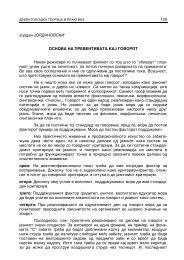
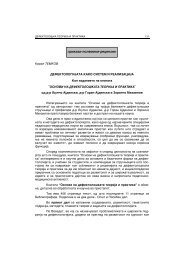
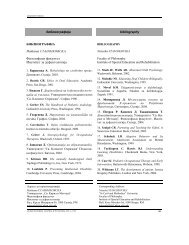
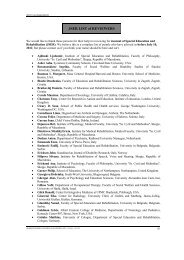
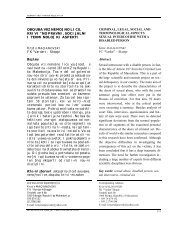
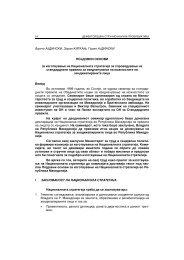
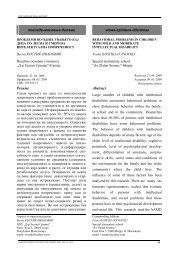
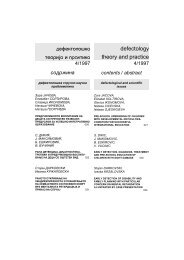
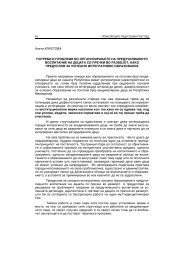
![b. apostoloski, m. ]aeva-pejkovska, s. nikolova, rana detekcija na ...](https://img.yumpu.com/32641898/1/184x260/b-apostoloski-m-aeva-pejkovska-s-nikolova-rana-detekcija-na-.jpg?quality=85)
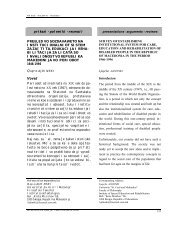
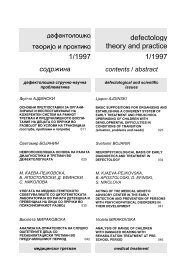
![45 Nada [IKI], Jelena IVI^EVI]-DESNICA AFAZIJA-EPILEPSIJA ...](https://img.yumpu.com/30952817/1/184x260/45-nada-iki-jelena-ivievi-desnica-afazija-epilepsija-.jpg?quality=85)
![120 Liljana KATI] Jagoda \OR\EVI] RAN TRETMAN NA EDEN ...](https://img.yumpu.com/29494618/1/184x260/120-liljana-kati-jagoda-orevi-ran-tretman-na-eden-.jpg?quality=85)